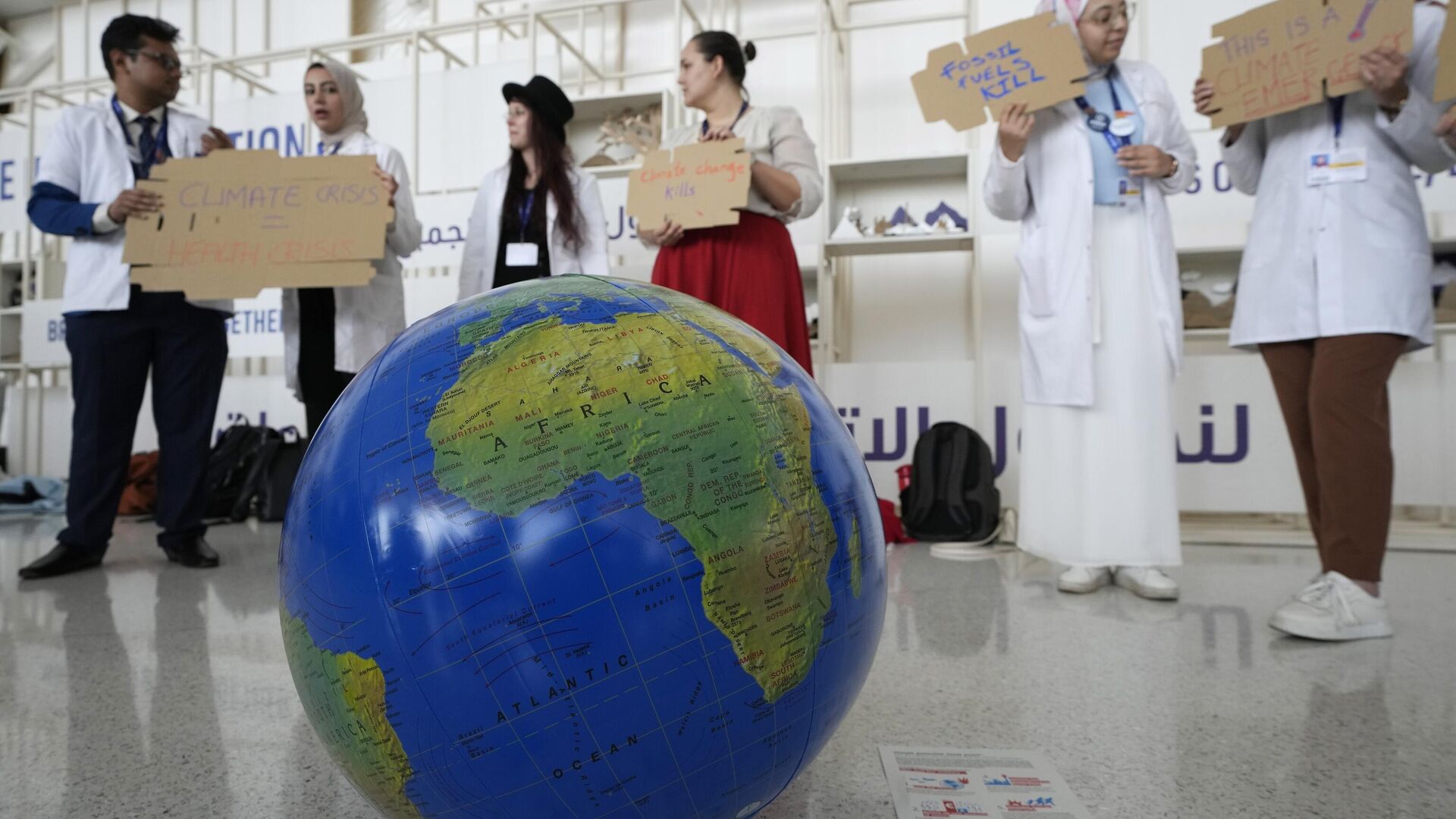https://en.sputniknews.africa/20240305/africa-to-lack-25-trillion-in-climate-needs-by-2030-un-warns-1065390334.html
Africa to Lack $2.5 Trillion in Climate Needs by 2030, UN Warns
Africa to Lack $2.5 Trillion in Climate Needs by 2030, UN Warns
Sputnik Africa
Last September, the African Union Commission and the UN Economic Commission for Africa disclosed that African countries will need about $2.8 trillion by 2030... 05.03.2024, Sputnik Africa
2024-03-05T11:39+0100
2024-03-05T11:39+0100
2024-03-05T11:50+0100
sub-saharan africa
climate
climate change
cyril ramaphosa
abiy ahmed
zimbabwe
united nations (un)
southern africa
https://cdn1.img.sputniknews.africa/img/07e7/0c/03/1063932385_0:160:3072:1888_1920x0_80_0_0_e4dc98fb35d2f74e67b1e39fea693c74.jpg
By 2030, the African continent will fall short of the $2.5 trillion needed to fight climate change, Hanan Morsy, chief economist of the United Nations Economic Commission for Africa, told a conference in Victoria Falls, Zimbabwe.She warned of the consequences of underfunding clean energy, pointing out that Africa receives only 2% of global investment in the sector and needs $2.8 trillion by 2030.Despite low emissions compared to other continents, climate change is costing African countries 5% of their gross domestic product each year, she added.The official added that "the situation is further compounded by heavy public debt," and that African nations pay 1.7% more in interest on their debt than other nations.Last December, Ethiopian Prime Minister Abiy Ahmed, speaking at COP28, a UN conference on climate change, pointed out that no nation can successfully address the climate crisis if debt is a burden.South African President Cyril Ramaphosa, speaking at the summit, called for more funding for the countries most vulnerable to climate change, which he said including African nations.In this vein, Ramaphosa lamented that developing countries have borne the brunt of the negative effects of climate change, and that the commitments of developed countries are "not being met."
https://en.sputniknews.africa/20231210/imf--world-bank-continue-to-fail-africa-economist-on-financing-and-combating-climate-change-1064042283.html
zimbabwe
southern africa
Sputnik Africa
feedback@sputniknews.com
+74956456601
MIA „Rossiya Segodnya“
2024
Maxim Grishenkin
https://cdn1.img.sputniknews.africa/img/07e7/0a/17/1063018107_0:0:1104:1103_100x100_80_0_0_03090c85a11f5d2e8a19cf1d989443c9.jpg
Maxim Grishenkin
https://cdn1.img.sputniknews.africa/img/07e7/0a/17/1063018107_0:0:1104:1103_100x100_80_0_0_03090c85a11f5d2e8a19cf1d989443c9.jpg
News
en_EN
Sputnik Africa
feedback@sputniknews.com
+74956456601
MIA „Rossiya Segodnya“
Sputnik Africa
feedback@sputniknews.com
+74956456601
MIA „Rossiya Segodnya“
Maxim Grishenkin
https://cdn1.img.sputniknews.africa/img/07e7/0a/17/1063018107_0:0:1104:1103_100x100_80_0_0_03090c85a11f5d2e8a19cf1d989443c9.jpg
climate, climate change, cyril ramaphosa, abiy ahmed, zimbabwe, united nations (un), southern africa
climate, climate change, cyril ramaphosa, abiy ahmed, zimbabwe, united nations (un), southern africa
Africa to Lack $2.5 Trillion in Climate Needs by 2030, UN Warns
11:39 05.03.2024 (Updated: 11:50 05.03.2024) Last September, the African Union Commission and the UN Economic Commission for Africa disclosed that African countries will need about $2.8 trillion by 2030 to meet their climate commitments under the 2015 Paris Agreement.
By 2030, the African continent will fall short of the $2.5 trillion needed to fight climate change, Hanan Morsy, chief economist of the United Nations Economic Commission for Africa, told a conference in Victoria Falls, Zimbabwe.
She warned of the consequences of
underfunding clean energy, pointing out that Africa receives only 2% of global investment in the sector and needs $2.8 trillion by 2030.
"We end up in a vicious circle with investment shortfalls increasing exposure risk and worsening impact, further eroding fiscal space and raising finance costs," Morsy explained.
Despite low emissions compared to other continents, climate change is costing African countries 5% of their gross domestic product each year, she added.
The official added that "the situation is further compounded by heavy public debt," and that African nations pay 1.7% more in interest on their debt than other nations.
Last December, Ethiopian Prime Minister Abiy Ahmed, speaking at COP28, a UN conference on climate change,
pointed out that no nation can successfully address the climate crisis if debt is a burden.
South African President Cyril Ramaphosa, speaking at the summit,
called for more funding for the countries most vulnerable to climate change, which he said including African nations.
In this vein, Ramaphosa lamented that developing countries
have borne the brunt of the negative effects of climate change, and that the commitments of developed countries are "not being met."



